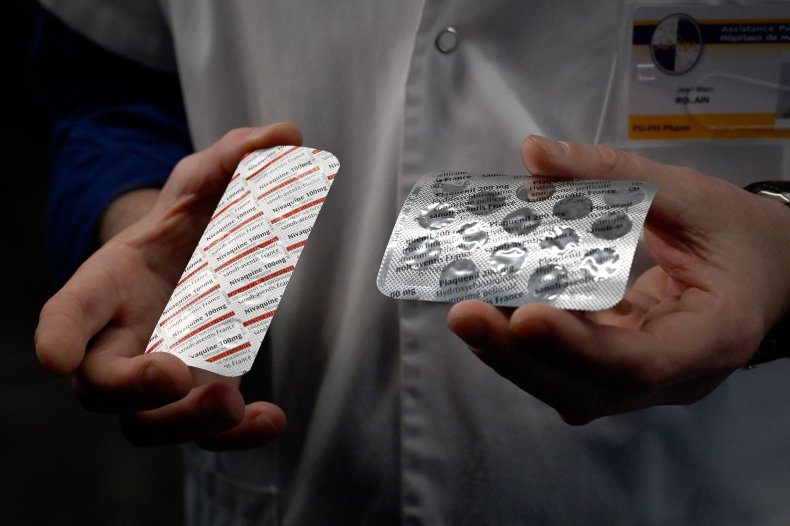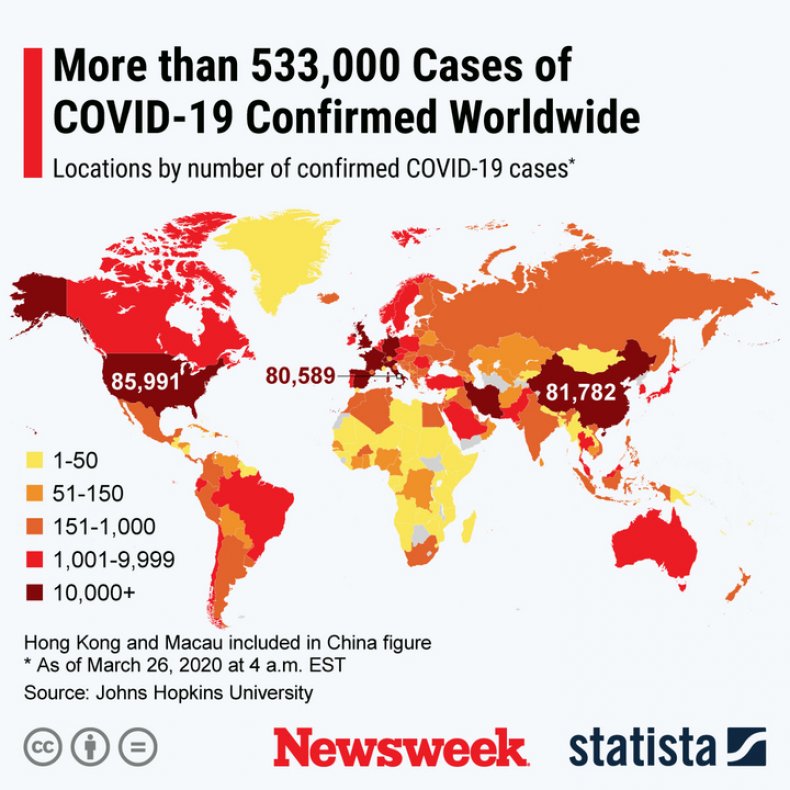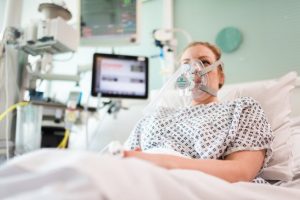The U.S. Food and Drug Administration (FDA) has approved the use of two anti-malaria drugs to treat patients infected by the new coronavirus.
On Sunday, the U.S. Department of Health and Human Services (HHS) said in a statement that chloroquine and hydroxychloroquine could be prescribed to teens and adults with COVID-19 “as appropriate, when a clinical trial is not available or feasible,” after the FDA issued an Emergency Use Authorization. (EUA) That marked the first EUA for a drug related to COVID-19 in the U.S., according to the statement.
Currently, there are no specific drugs for COVID-19 which, as shown in the Statista graph below (accurate as of March 26), has sickened over half a million people. According to Johns Hopkins University, over 720,000 cases have been confirmed, more than 34,000 people have died, and over 152,000 have recovered since the pandemic started in China late last year.
Both chloroquine and hydroxychloroquine are used to treat diseases including malaria, and have “shown activity in laboratory studies against coronaviruses, including SARS-CoV-2 (the virus that causes COVID-19),” the HHS stated.
“Anecdotal reports suggest that these drugs may offer some benefit in the treatment of hospitalized COVID-19 patients. Clinical trials are needed to provide scientific evidence that these treatments are effective.”
Under the EUA, health care providers and patients must be given fact sheets outlining the known risks and drug interactions of the medications.
The HSS said it accepted 30 million doses of hydroxychloroquine sulfate from an arm of the pharmaceutical company Novartis, and one million of chloroquine phosphate from Bayer Pharmaceuticals to be used for treating hospitalized COVID-19 patients or in clinical trials.
“These and other companies may donate additional doses, and companies have ramped up production to provide additional supplies of the medication to the commercial market,” the HHS said.
“Given the importance of understanding the efficacy of these medications for the treatment and prevention of COVID-19, federal agencies, such as the National Institutes of Health and ASPR’s Biomedical Advanced Research and Development Authority (BARDA), are working together to plan clinical trials.”
The Strategic National Stockpile will ship the drugs to states, according to the statement.
The HHS said it hoped the donated drugs would “ease supply pressures” for the medications, and that it was working with manufacturers to boost production to ensure those who depend on them to treat conditions such as malaria, lupus, and rheumatoid arthritis have access.
The decision comes after FDA commissioner Stephen Hahn said that the agency would “take a closer look” at chloroquine in “a large pragmatic clinical trial—to actually gather that information and answer that question that needs to be asked and answered,” after President Donald Trump said chloroquine and hydroxychloroquine showed promise in COVID-19 patients.
 A healthcare worker shows packets of a Nivaquine, tablets containing chloroquine and Plaqueril, tablets containing hydroxychloroquine, at IHU Mediterranee Infection Institute in Marseille, France, on February 26, 2020. GERARD JULIEN/AFP via Getty Images
A healthcare worker shows packets of a Nivaquine, tablets containing chloroquine and Plaqueril, tablets containing hydroxychloroquine, at IHU Mediterranee Infection Institute in Marseille, France, on February 26, 2020. GERARD JULIEN/AFP via Getty ImagesLast week, the authors of a paper published in the Journal of Zhejiang University concluded that hydroxychloroquine is no better a treatment for coronavirus than currently used methods.
Vineet Menachery, Assistant Professor in the Department of Microbiology & Immunology at the University of Texas Medical Branch who was not involved in the research, cautioned to Newsweek last week that the paper involved a small number of participants. And while the patients didn’t improve and it doesn’t appear to worsen COVID-19, there are concerns about its side effects.
He told Newsweek: “Like the papers to date on hydroxychloroquine and chloroquine, there isn’t much concrete data.”
As experts investigate the potential benefits of the drugs, health officials last week urged members of the public not to self-medicate, after an Arizona man who took chloroquine phosphate in the form of a fish tank cleaner died.
World Health Organization advice for avoiding spread of coronavirus disease (COVID-19)
Hygiene advice
- Clean hands frequently with soap and water, or alcohol-based hand rub.
- Wash hands after coughing or sneezing; when caring for the sick; before, during and after food preparation; before eating; after using the toilet; when hands are visibly dirty; and after handling animals or waste.
- Maintain at least 1 meter (3 feet) distance from anyone who is coughing or sneezing.
- Avoid touching your hands, nose and mouth. Do not spit in public.
- Cover your mouth and nose with a tissue or bent elbow when coughing or sneezing. Discard the tissue immediately and clean your hands.
Medical advice
- Avoid close contact with others if you have any symptoms.
- Stay at home if you feel unwell, even with mild symptoms such as headache and runny nose, to avoid potential spread of the disease to medical facilities and other people.
- If you develop serious symptoms (fever, cough, difficulty breathing) seek medical care early and contact local health authorities in advance.
- Note any recent contact with others and travel details to provide to authorities who can trace and prevent spread of the disease.
- Stay up to date on COVID-19 developments issued by health authorities and follow their guidance.
Mask and glove usage
- Healthy individuals only need to wear a mask if taking care of a sick person.
- Wear a mask if you are coughing or sneezing.
- Masks are effective when used in combination with frequent hand cleaning.
- Do not touch the mask while wearing it. Clean hands if you touch the mask.
- Learn how to properly put on, remove and dispose of masks. Clean hands after disposing of the mask.
- Do not reuse single-use masks.
- Regularly washing bare hands is more effective against catching COVID-19 than wearing rubber gloves.
- The COVID-19 virus can still be picked up on rubber gloves and transmitted by touching your face.



















